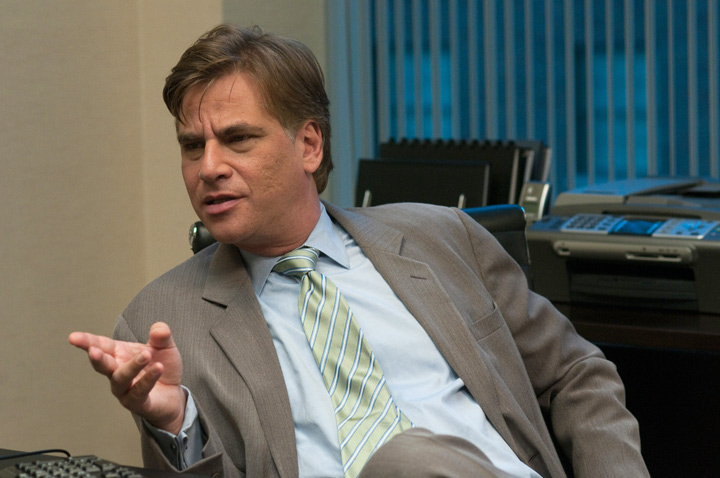 Aaron Sorkin has proven to be one of the more distinguished and reputable television scribes in the history of the form, writing for shows like “The West Wing” and “Studio 60 on the Sunset Strip” that are as intellectually thrilling as they are occasionally glib. He’s a master of the high art of verbal chicanery, and his barbs and eloquent put-downs are hard to beat. His most recent project, “The Newsroom” (which kicked off its third and final season last night — recap here) has been perhaps his most divisive yet: an unabashedly blunt hour of television that’s been accused of sexism, ludicrous exaggeration and a whole litany of other things. Perhaps weary of fending off his increasingly venomous critics, Sorkin has officially announced his intentions of retiring from television — presumably to focus on more cinematic projects like his Danny Boyle-directed biopic of Steve Jobs.
Aaron Sorkin has proven to be one of the more distinguished and reputable television scribes in the history of the form, writing for shows like “The West Wing” and “Studio 60 on the Sunset Strip” that are as intellectually thrilling as they are occasionally glib. He’s a master of the high art of verbal chicanery, and his barbs and eloquent put-downs are hard to beat. His most recent project, “The Newsroom” (which kicked off its third and final season last night — recap here) has been perhaps his most divisive yet: an unabashedly blunt hour of television that’s been accused of sexism, ludicrous exaggeration and a whole litany of other things. Perhaps weary of fending off his increasingly venomous critics, Sorkin has officially announced his intentions of retiring from television — presumably to focus on more cinematic projects like his Danny Boyle-directed biopic of Steve Jobs.
“I know the whole never-say-never stuff, but I’m pretty certain I’m about to write my last three episodes of television,” the 53-year-old writer told the Los Angeles Times recently. In a display of endearing candor that might befit one of the hyper-literate brainiacs he so frequently writes, Sorkin addressed his own legacy and the lessons he’s learned working in the cutthroat business that has earned him eleven Emmy nominations and six wins.
“I’ve loved every minute I’ve spent in television. And I’ve had much more failure, as traditionally measured, than success in television. I’ve done four shows, and only one of them was ‘The West Wing. ‘ "
Sorkin’s move away from T.V. is certainly not in vogue with the current exodus of directors who are now keen to work in television. David Fincher applied his slick, gloomy vision to Netflix’s “House of Cards” and now Jason Reitman is doing a half-hour family comedy called “Casual” for Hulu. Perhaps Mike Leigh will step in to direct an episode of “Downton Abbey”? Maybe Wes Anderson will helm the third season of "True Detective," in which our two heroes don corduroy blazers and go searching for their missing surrogate fathers. The key difference is that these are directors – auteurs, in some cases – who are eager to flex their skills in a medium that favors and nourishes long-form storytelling. Sorkin is a writer and there’s always the chance that maybe he’s looking to compress his narratives instead of expanding them. In any case, we’ll miss him – this writer is of the opinion that Sorkin’s gift (particularly for dialogue) is formidable and that “The Newsroom,” while far from “The West Wing,” is a fitfully entertaining example of Sorkin’s talents.
Back in 2010, Sorkin won his first Oscar with “The Social Network,” an electrifying, sinister and hilarious study of the formation of Facebook and the egos and financial livelihoods that were destroyed in the process. Last week, Facebook CEO Mark Zuckerberg hosted a Q&A where the David Fincher-directed drama was unmistakably a lightning rod for conversation. Zuckerberg – who has been vocal about his public dislike for the movie – took some time to address what he thought to be some of the film’s more glaring structural flaws, and how he sees them in hindsight.
"The reality is that writing code and building a product and then building a company actually is not a glamorous enough thing to make a movie about.…If they were really making a movie [of my life], it would have been of me sitting at a computer, coding for two hours straight, which probably would have not been that good of a movie,” Zuckerberg stated (via THR).
Zuckerberg has attacked Fincher and Sorkin for what he believes to be “fictionalized” elements of his own story, including the notion that the intention behind Facebook was motivated dually by a desperate need to meet women and the bitter resistance of a scorned former girlfriend. "They just kind of made up a bunch of stuff that I found kind of hurtful,” he says. Aw. Does the poor little billionaire need a hug? One person’s truth is another’s fiction we suppose. Just ask Eduardo Saverin or the Winklevoss twins…

